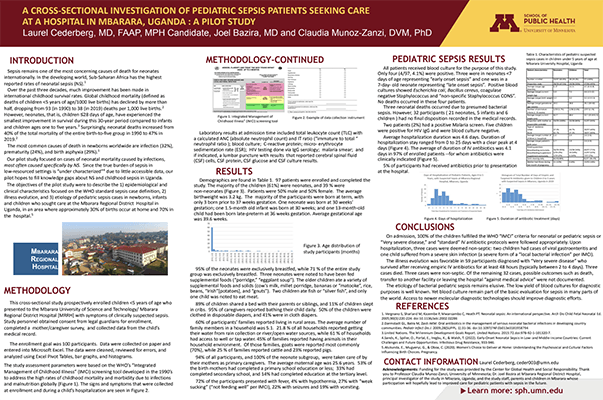Laurel Cederberg
MPH, Maternal & Child Health
Co-Authors:
Joel Bazira, Amika Kamath, Claudia Munoz-Zanzi
Advisor:
Claudia Munoz-Zanzi
Keywords:
Pediatric sepsis, neonatal sepsis, Uganda
Abstract
Attempts to decrease “Under Five Years of Age” Childhood Mortality Rates worldwide have seen successful over the past 30 years, but a deeper look by J. Ditai, et al. in 2019 shows that “Under 28 Days of Age” Neonatal Mortality Rates have not decreased as much, especially in lower resourced regions around the world. Neonatal sepsis is one of the main causes of neonatal mortality, especially in low-resourced regions of world.
Our pilot study focuses on childhood and neonatal mortality rates due to sepsis in a Western Ugandan hospital in Mbarara, Uganda in 2019, just prior to the SARS-COV-2 pandemic. We aim to address knowledge gaps and improve outcomes in neonates and all children under age five years, but with a focus on neonates, as part of the past UN Millennium Development Goals (#4A) of 2015, whose spirit lives on in the present UN Sustainable Development Goals (#1,#2,#3 and #10).
The specific objective was to investigate neonatal and pediatric sepsis mortality rates and elucidate infectious etiologies, risk factors, outcomes, as well as diagnostic and treatment barriers by applying the WHO “Integrated Management of Childhood Illness”-based guidelines to screen for neonatal and pediatric sepsis. We enrolled patients prospectively and applied a standardized protocol that included a complete blood count, blood culture, HIV testing, malaria testing, and C-reactive protein on all participants, while also collecting patient and caregiver data through interviews (demographics, daily cares, and household and environmental factors), and medical record review (hospital courses and outcomes).

View Poster (PDF)
